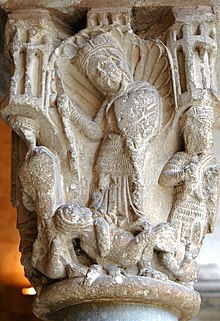 The Psychomachia (Battle of spirits or soul war) by the Late Antique Latin poet Prudentius, from the early fifth century AD,[1] is probably the first and most influential "pure" medieval allegory, the first in a long tradition of works as diverse as the Romance of the Rose, Everyman, and Piers Plowman.
The Psychomachia (Battle of spirits or soul war) by the Late Antique Latin poet Prudentius, from the early fifth century AD,[1] is probably the first and most influential "pure" medieval allegory, the first in a long tradition of works as diverse as the Romance of the Rose, Everyman, and Piers Plowman.
In slightly less than a thousand lines, the poem describes the conflict of vices and virtues as a battle in the style of Virgil's Aeneid. Christian faith is attacked by and defeats pagan idolatry to be cheered by a thousand Christian martyrs. The work was extremely popular, and survives in many medieval manuscripts, 20 of them illustrated.[2] It may be the subject of wall paintings in the church at Claverley, Shropshire, England.
The word may be used more generally for the common theme of the "battle between good and evil", for example in sculpture.
Characters
The plot consists of the personified virtues of Hope, Sobriety, Chastity, Humility, etc. fighting the personified vices of Pride, Wrath, Paganism, Avarice, etc. The personifications are women because in Latin, words for abstract concepts have feminine grammatical gender; an uninformed reader of the work might take the story literally as a tale of many angry women fighting one another, because Prudentius provides no context or explanation of the allegory.[3]
- Chastity is assaulted by Lust, but cuts down her enemy with a sword.
- Anger attacks Patience, but cannot defeat or even injure her; driven mad with frustration, Anger ultimately kills herself instead.
- Greed is pitted against Love, but is unable to obtain that with which it cannot coexist.
In a similar manner, various vices fight corresponding virtues and are always defeated. Biblical figures that exemplify these virtues also appear (e.g. Job as an example of patience).
Despite the fact that seven virtues defeat seven vices, they are not the canonical seven deadly sins, nor the three theological and four cardinal virtues.
Notable manuscripts
- Berne, Burgerbibliothek Cod. 264, region of Lake Constance c. AD 900. Parchment, 145 foll., 27.3/28.3 x 21.5/22 cm. The ms. is counted among the outstanding examples of Carolingian book art. It contains all seven poems by Prudentius plus an added eighth poem; given to the Strasbourg diocese in the 990s and later was acquired by Jacques Bongars.[4]
- Cambridge, Corpus Christi College, MS 23; Prudentius, Psychomachia and other poems, 10th century, English.[5]
- London, British Library, MS Add. 24199, part 1; Miscellany (Prudentius, Psychomachia), 10th century
- MS Cotton Cleopatra C VIII; Prudentius, Psychomachia, 10th century
- Munich, Staatsbibliothek, CLM. 29031b; Prudentius, Psychomachia, 10th century
No comments:
Post a Comment